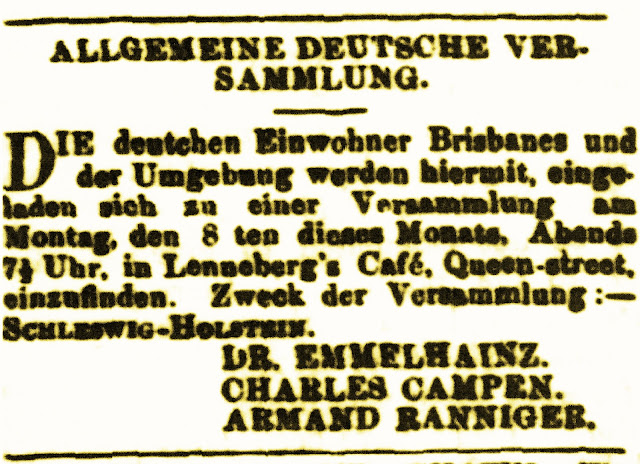In 1863, one of the largest hotels in Brisbane Town was the Freemasons’ Hotel in Albert Street. It had been taken over the previous year by a new lessee, Henry Meyer, and was well patronised by the German community.
 |
| Advertisement in The Courier, September 1, 1862 |
On a night in January 1863, strange events were afoot at the Freemasons’ Hotel. It would all come to light in Court after the landlord, one Henry Meyer, was charged with “Assault with intent to ravish and carnally know one Wilhelmina Backhaus”.[1]
She gave her evidence as follows: On the night of the 5th January I was awakened from my sleep in my own bed - I was undressed - by Mr. Meyer coming into my room with this piece of candle (producing half of a stearine[2] candle) lighted. He put the candle over my face. I said, in German, "Hallo." He said, in German, "Hallo, where's your husband?" We always talked German. I said, "I don't know; I think he's in the bar."
So Meyer said, "If I was your husband, I would go into bed at the same time as you." I said, "What for?" So Meyer said, "It is no harm to us; I'll take your husband's place in bed." I said to him, "No, Mr. Meyer, that will not do;" and sent him away. I said, "I stick to my husband, and you stick to your wife." So Meyer said, "I don't care a button for my wife; I want another woman."
After this seductive patter, Meyer proceeded with the ravishing.
So Meyer then blow the candle out and put it on the looking-glass, and shut the door; and then he came into bed.
[The witness then described most circumstantially that an attempt to assault her criminally had been made by the defendant, and in spite of her remonstrances and exertions to put him away, and against her consent; the assault was nearly being consummated, when complainant said] -
"Meyer, if you do not keep quiet now, I'll call my husband, and your missus."
So soon as I said those words (continued the witness) my husband opened the door, and found Meyer in bed.
 |
| Colonial Bar Room |
At this point Henry Meyer’s lawyer pursued the standard defence of the time in cases of this kind, seeking to discredit the complainant by raising doubts as to her truthfulness and her morality.
Mr. Petrie: Did you make no noise, nor sing out?
Witness: I said I would tell my husband, and all the people. Meyer took the piece of candle and looked about, and outside the door, and said "Oh, don't sing out, there's nobody there."
Mr. Petrie: Do you know what time it was?
Witness: It was after I went to bed.
Mr. Warry: How long was he in bed altogether?
Witness: About a quarter of an hour. He said he had looked outside and nobody was about, and my husband was quite comfortable. He did not go out of the room at all. He looked out before he came in.
I have known Meyer for two or three weeks since I came from Rockhampton. My husband and I were lodging there. I did not sing out because I was undressed. I had no petticoat on, or I would have run away. Meyer was stronger than I, and I could not get from him. He had a glass in his hand; he was not drunk, he was not sober. When my husband opened the door my husband saw him, and as he went out he passed my husband.
 |
| Early view of Albert Street, Brisbane |
The logical person to support this testimony would have been the complainant’s husband who had interrupted the ravishing. After he commenced his evidence, the defence successfully objected to his appearing as a witness.
Sebastian Backhaus being called into the witness-box, Mr. Garrick objected to the evidence of the husband, and eventually his objection was allowed, though not till after the witness had been sworn and given part of his evidence
At this point the testimony of the complainant gets rather confusing. None of the parade of witnesses could or would confirm Frau Backhaus’s story.
 |
| 19th Century housemaid |
I did not go into complainant's bedroom. I remained to dust a room and saw master go along the passage and into a bedroom on the left hand - not the complainant's room. Saw him return in about two minutes afterwards with a piece of candle in his hand. I was in the rooms upstairs about twenty minutes.
While there I must have heard any loud talking, if there had been any, in complainant's room. I heard nothing. When I came down stairs Mr. Meyer was in the bar; it was nearly nine o'clock when I came down. I did not see Meyer after that time; but one of the girls told me he had gone to bed.
James Mackie, a lodger at the Freemasons' Hotel, deposed that on the evening of the 5th. between seven and ten o'clock, he and three other men were sitting on the balcony, within two yards of the complainant's bedroom door, and that he neither heard or saw anyone in the room.
Richard Moldner, a German, gave evidence showing that complainant had not been guarded or modest in her conduct towards him; she having one day gone into his room while he was lying on his bed, and asked him to "shout."[3]
Not surprisingly, the Bench were quick to dismiss the case.
This closed the defendant's case, and the Bench, without asking Mr. Garrick to address the court, dismissed the case.
Thus, despite the lengthy proceedings of the court, what actually occurred on that night in January 1863, at the Freemasons’ Hotel remains unresolved. But it certainly made good copy for The Courier.







